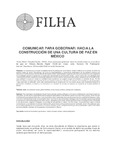
Please use this identifier to cite or link to this item:
http://ricaxcan.uaz.edu.mx/jspui/handle/20.500.11845/1120Full metadata record
| DC Field | Value | Language |
|---|---|---|
| dc.contributor | 575286 | es_ES |
| dc.contributor.other | https://orcid.org/0000-0002-8638-7845 | - |
| dc.creator | Flores Pérez, Claudia Cecilia | - |
| dc.date.accessioned | 2019-09-23T15:02:48Z | - |
| dc.date.available | 2019-09-23T15:02:48Z | - |
| dc.date.issued | 2018-07 | - |
| dc.identifier | info:eu-repo/semantics/publishedVersion | es_ES |
| dc.identifier.issn | 2594-0449 | es_ES |
| dc.identifier.uri | http://ricaxcan.uaz.edu.mx/jspui/handle/20.500.11845/1120 | - |
| dc.identifier.uri | https://doi.org/10.48779/cmvw-m535 | - |
| dc.description | The importance of establishing Social Communication policies in Mexico in the sense of defining the main lines of action for information, as well as the responsibility and consequent participation of the different sectors involved in this process. Given the lack of official and systematized information, a communication crisis is generated, because the government is overwhelmed because it does not have a well-structured social communication team, much less a clear and precise strategy to stop the collective paranoia generated by the wave of violence that plagues the entire country, escalating social unrest, whose population does not hesitate to show its hostility to the government, judging it incapable of providing an atmosphere of peace. For this reason, the predominant place of social communication as an element of cohesion between the government and its governed must be vindicated, and for this particular case, as a fundamental pillar for the construction of a culture of peace, which, strengthened through citizen participation, right to information and accountability, translate into the guarantor of governance in Mexico. | es_ES |
| dc.description.abstract | La importancia que reviste el establecimiento de políticas de Comunicación Social en México en el sentido de definir las grandes líneas de acción informativas, así como la responsabilidad y consecuente participación de los distintos sectores que intervienen en dicho proceso. Ante la falta de información oficial y sistematizada, se genera una crisis comunicacional, pues el gobierno se ve rebasado porque no cuenta con un equipo bien estructurado de comunicación social, y mucho menos con una estrategia clara y precisa para detener la paranoia colectiva generada por la ola de violencia que azota al país entero, escalando así el malestar social, cuya población no duda en mostrar su hostilidad hacia el gobierno, por juzgarlo incapaz de brindarle un ambiente de paz. Por ello debe reivindicarse el lugar preponderante de la comunicación social como elemento de cohesión entre el gobierno y sus gobernados, y para este caso en particular, como pilar fundamental para la construcción de una cultura de paz, que, fortalecida mediante la participación ciudadana, el derecho a la información y la rendición de cuentas, se traduzca en el garante de la gobernabilidad en México. | es_ES |
| dc.language.iso | spa | es_ES |
| dc.publisher | Universidad Autónoma de Zacatecas | es_ES |
| dc.relation.uri | generalPublic | es_ES |
| dc.rights | Atribución-NoComercial-CompartirIgual 3.0 Estados Unidos de América | * |
| dc.rights.uri | http://creativecommons.org/licenses/by-nc-sa/3.0/us/ | * |
| dc.source | FilhA, No. 18, Julio 2018. | es_ES |
| dc.subject.classification | CIENCIAS SOCIALES [5] | es_ES |
| dc.subject.other | comunicación social | es_ES |
| dc.subject.other | gobernabilidad | es_ES |
| dc.subject.other | cultura de paz | es_ES |
| dc.subject.other | política | es_ES |
| dc.subject.other | participación ciudadana | es_ES |
| dc.title | Comunicar para gobernar: hacia la construcción de una cultura de paz en México | es_ES |
| dc.type | info:eu-repo/semantics/article | es_ES |
| Appears in Collections: | *Documentos Académicos*-- UA Docencia Superior | |
Files in This Item:
| File | Description | Size | Format | |
|---|---|---|---|---|
| 20180731130311_comunicar_para_gobernar.pdf | 216,83 kB | Adobe PDF |  View/Open |
This item is licensed under a Creative Commons License
